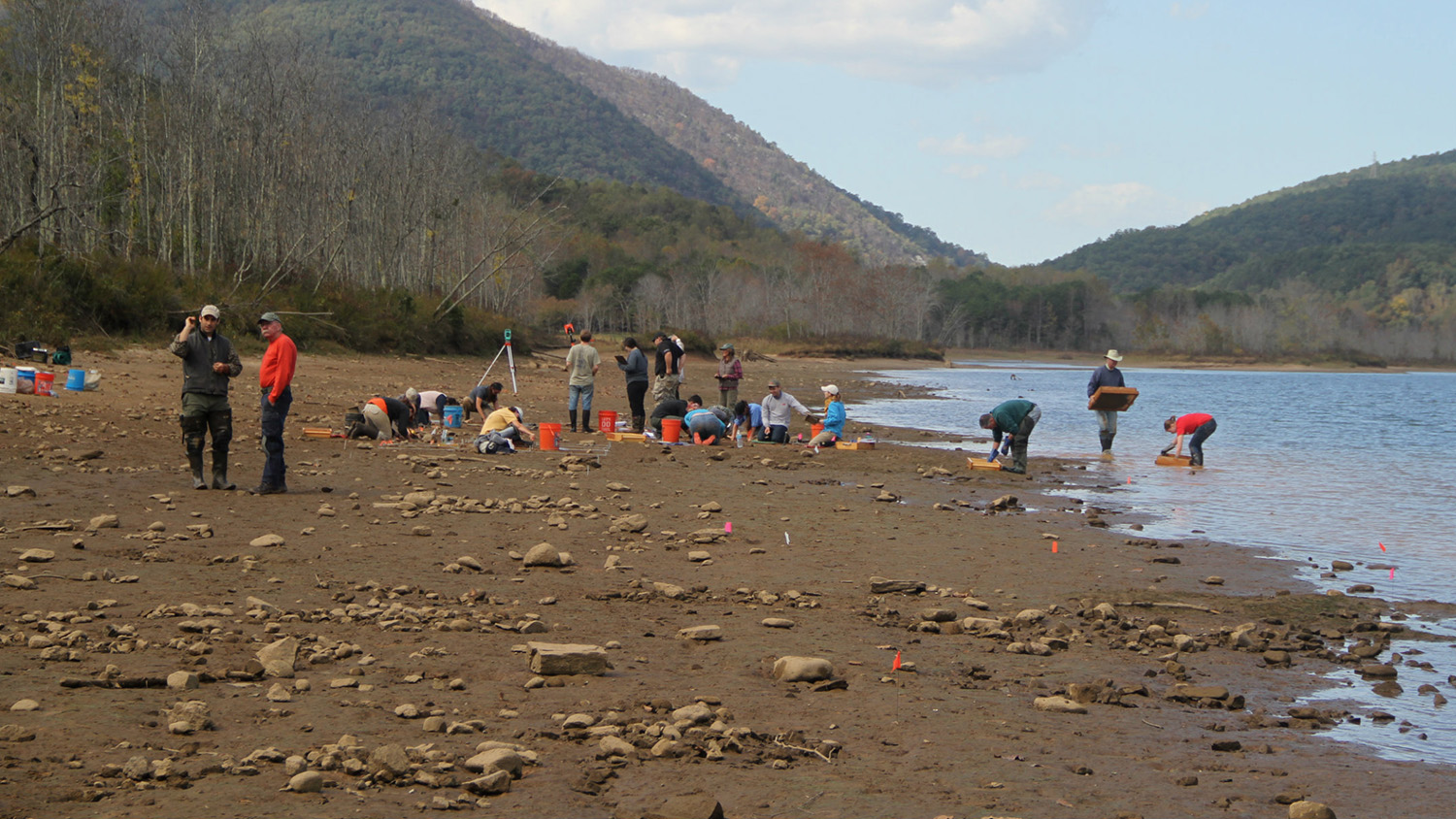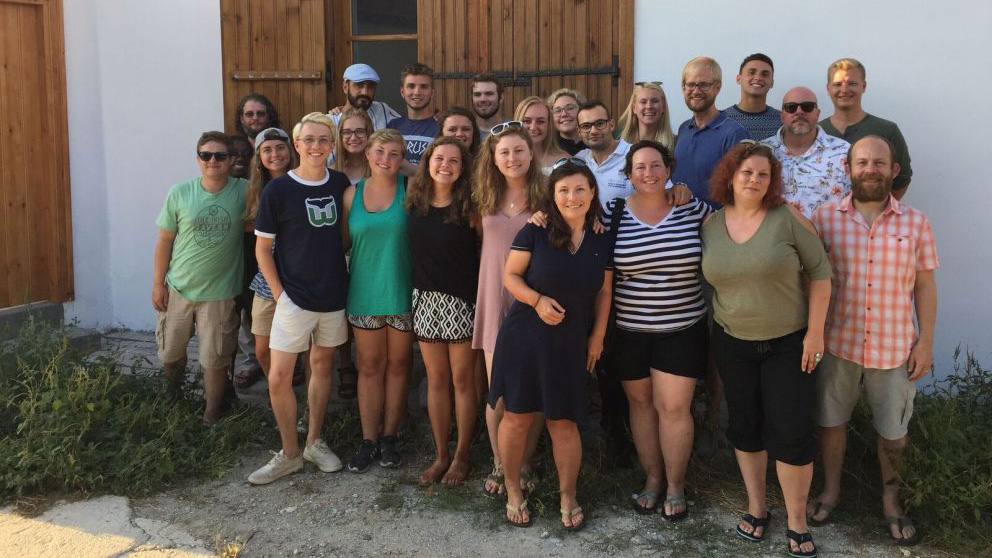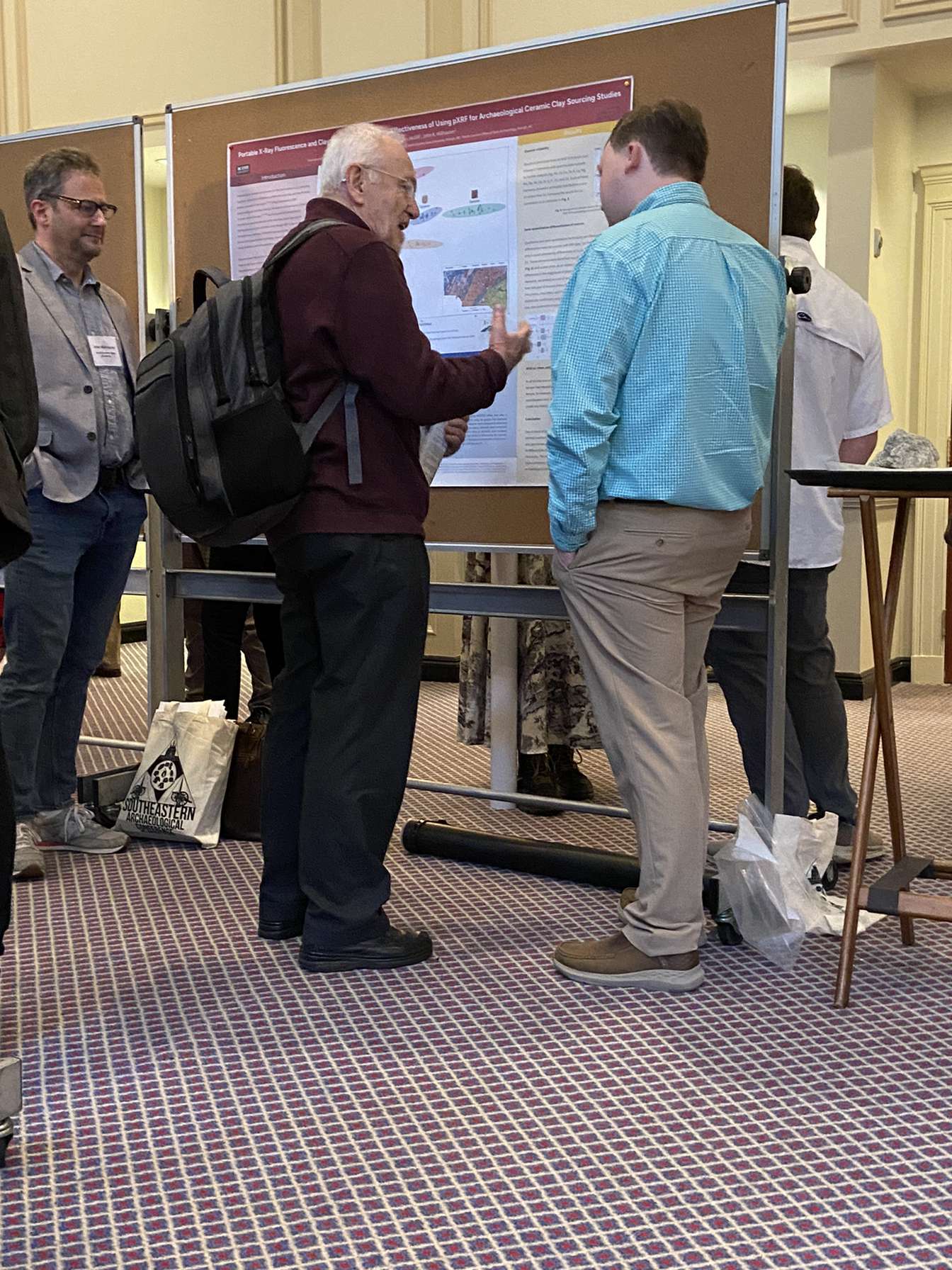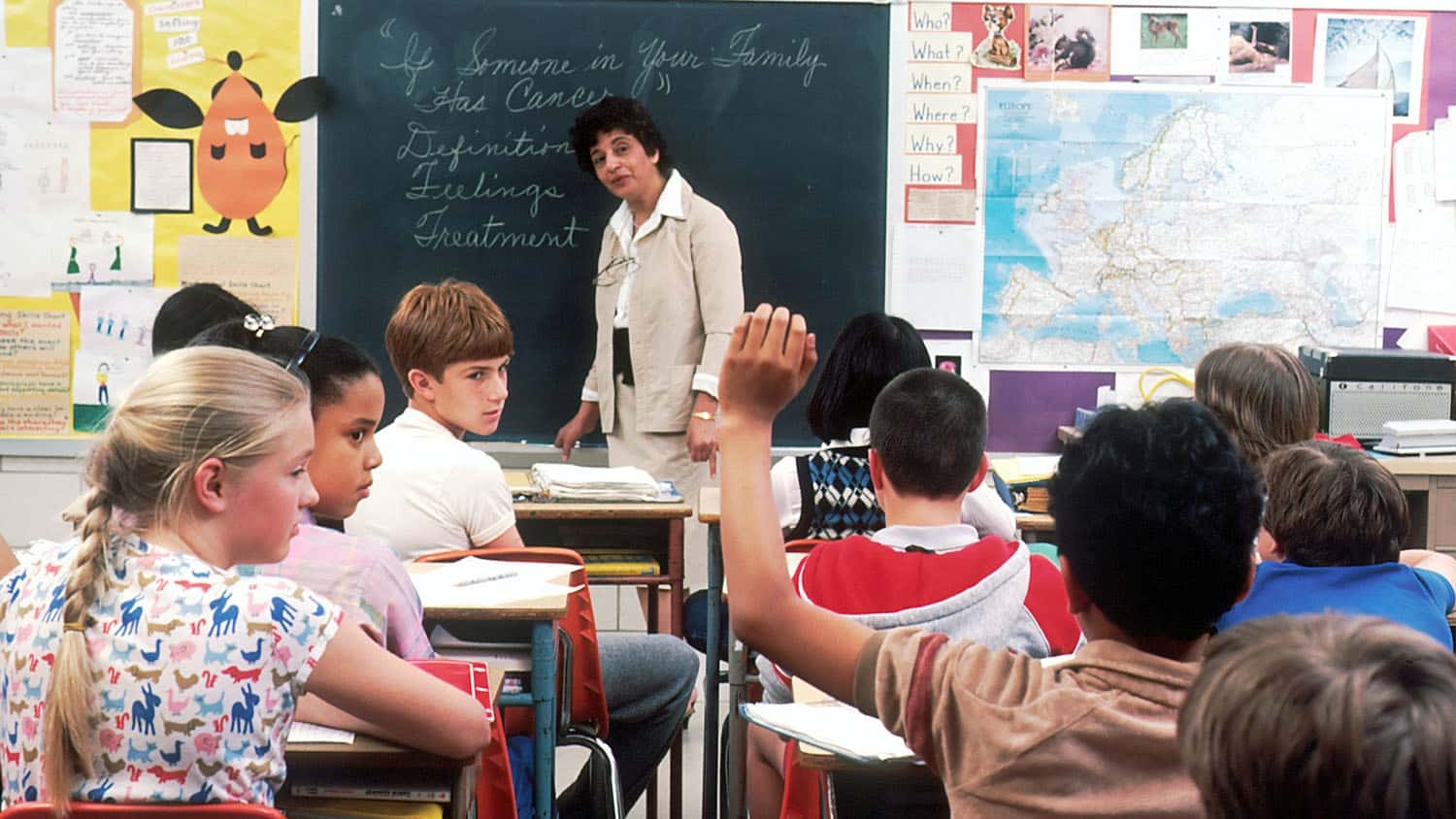
Research and Engagement
We study what it means to be human, to live in society, to create and recreate ourselves and our cultures.
Purposeful Research
Our faculty — and our students — dig up tiny sherds of pottery and bones. They put entire societies and cultures under their microscopes. They’re driven to examine and understand what we can learn from the past — and how we can guide the future.
We’ve made our mark in studies of family sociology, ecological change, work and labor markets, migration, nonprofit organizations, and crime, to name just a few.
Our research, which appears in the top journals of our fields, creates new knowledge that informs pressing issues in our communities. It helps solve problems.
In the Community

As part of our university’s land-grant mission, we serve North Carolina citizens through our research and engagement activities. Locally, we bring our expertise to projects like the Friends of Oberlin Cemetery, an initiative to preserve a culturally significant African American cemetery in Raleigh.
We also work with industries and governments to solve problems related to food insecurity, climate change, child abuse, poverty and inequality, among other issues.
Our faculty and students also embed themselves abroad to explore the effects that tourism, globalization, political change and other factors have on communities.
Resources for Researchers
The College of Humanities and Social Sciences research office can help faculty navigate projects, locate funding sources and make connections in the community.
Publications
Our faculty have made significant contributions to the breadth and depth of scholarship in their fields. These publications are indicative of our scholarship and our research interests.
Sarah Bowen
- Bowen, Sarah. 2010. “Embedding Local Places in Global Spaces: Geographical Indications as a Territorial Development Strategy.” Rural Sociology 75(2): 209-243.
- Bowen, Sarah and Marie Sarita Gaytan. 2012. “The Paradox of Protection.” Social Problems 59(1): 70-93.
- Bowen, Sarah and Ana Valenzuela Zapata. 2009. “Geographical Indications, Terroir, and Socioeconomic and Ecological Sustainability: The Case of Tequila.” Journal of Rural Studies 25: 108-119.
Jennifer Carroll
- Ray, B., Korzeniewski, S. J., Mohler, G., & Carroll, J J. (2023). Spatiotemporal Analysis Exploring the Effect of Law Enforcement Drug Market Disruptions on Overdose, Indianapolis, Indiana, 2020–2021 American Journal of Public Health 113, 750-758, https://doi.org/10.2105/AJPH.2023.307291
Martha Crowley
- Crowley, Martha. 2012. “Control and Dignity in Professional, Manual and Service-Sector Employment.” Organization Studies 33(10): 1383-1406.
- Crowley, Martha. 2013. “Gender, the Labor Process and Dignity at Work.” Social Forces 91(4): 1209-1238.
- Crowley, Martha, Daniel Tope, Lindsey Joyce Chamberlain, and Randy Hodson. 2010. “Neo-Taylorism at Work: Occupational Change in the Post-Fordist Era.” Social Problems 57(3): 421-447.
Stacy De Coster
- Heimer, K., Malone, S. E., & De Coster, S. (2023). Trends in women’s incarceration rates in US prisons and jails: A tale of inequalities. Annual Review of Criminology, 6(1), 85-106. doi:10.1146/annurev-criminol-030421-041559
Michaela DeSoucey
- DeSoucey, Michaela. 2010. “Gastronationalism: Food Traditions and Authenticity Politics in the European Union.” American Sociological Review 75(3): 432-455.
- Cherry, Elizabeth, Colter Ellis and Michaela DeSoucey. 2011. “Food for Thought, Thought for Food: Consumption, Identity, and Ethnography.” Journal of Contemporary Ethnography 40(2): 231-258.
- Weber, Klaus, Kathryn L. Heinze and Michaela DeSoucey. 2008. “Forage for Thought: Mobilizing Codes in the Movement for Grass-fed Meat and Dairy Products.” Administrative Science Quarterly 53(3): 529-567.
Christian Doll
- Doll, C.J. (2024), HOW THÖŊ PINY BECAME JUBA NA BARI: Naming and Place-Making in Urban South Sudan. Int. J. Urban Reg. Res.. https://doi.org/10.1111/1468-2427.13214
Chelsey Dyer
- Dyer, Chelsey. 2024. “Latin American Solidarity in Changing Times .” Anthropology News website, January 24, 2024.
Kim Ebert
- Ebert, Kim and Dina G. Okamoto. 2013. “Social Citizenship, Integration, and Collective Action: Immigrant Civic Engagement in the United States.” Social Forces : 1-26.
- Okamoto, Dina and Kim Ebert. 2010. “Beyond the Ballot: Immigrant Collective Action in Gateways and New Destinations in the United States.” Social Problems 57(4): 529-558.
Andrea Leverentz
- Leverentz, A. M (2022). Intersecting Lives: How Place Shapes Reentry. University of California Press. https://www.ucpress.edu/book/9780520379435/intersecting-lives
- Leverentz, A. (2023) Interview Location as Data. Qual Sociol 46, 489–514. https://doi.org/10.1007/s11133-023-09548-4
Anna Manzoni
- Fouarge, Didier, Anna Manzoni, Ruud Muffels, and Ruud Luijkx. 2010. “Childbirth and Cohort Effects on Mother’s Labour Supply: A Comparative Study Using Life History Data for Germany, the Netherlands, and Great Britain.” Work, Employment & Society 24(3): 487-507.
- Manzoni, Anna. 2012. “In and Out of Employment: Effects in Panel and Life-History Data.” Advances in Life Course Research 17: 11-24.
- Manzoni, Anna and Irma Mooi-Reci. 2011. “Early Unemployment and Subsequent Career Complexity: A Sequence-Based Perspective.” Schmollers Jahrbuch (Journal of Applied Social Science Studies) 131(2): 339-348.
- Manzoni, Anna, Jeroen K. Vermunt, Ruud Luijkx, and Ruff Muffels. 2010. “Memory Bias in Retrospectively Collected Employment Careers: A Model-Based Approach to Correct for Measurement Error.” Sociological Methodology 40(1): 39-73.
- Jane Lee, B.-H., & Manzoni, A. (2024). Women’s Configurations of Family, Work, and Education: Mapping Diverse Pathways Throughout Adulthood. Social Currents, 11(1), 80-99. https://doi.org/10.1177/23294965231201373
Steve McDonald
- McDonald, Steve. 2009. “Right Place, Right Time: Serendipity and Informal Job Matching.” Socio-Economic Review : 1-25.
- McDonald, Steve. 2011. “What’s in the ‘Old Boys’ Network? Accessing Social Capital in Gendered and Racialized Networks.” Social Networks 22: 317-330.
- McDonald, Steve, Richard A. Benton, and David F. Warner. 2012. “Dual Embeddedness: Informal Job Matching and Labor Market Institutions in the United States and Germany.” Social Forces 91(1): 75-97.
John Millhauser
- Millhauser, John K. & Earle, Timothy (2022). Biodiversity and the Human Past: Lessons for Decolonizing Conservation. Biological Conservation, 272: 109599.
- Baron, Joanne & Millhauser, John (2021). A place for archaeology in the study of money, finance, and debt. Journal of Anthropological Archaeology 62: 101278.
- Millhauser, John K. (2020). Let’s get fiscal: The social relations of finance and technological change in Aztec and Colonial Mexico. Journal of Anthropological Archaeology 60: 101196.
- McGill, Dru E., Millhauser, John K., McGill, A., Melomo, John K.., Bohnenstiehl, D., & Wall. J. (2020) Wealth-in-people and the value of historical Oberlin Cemetery, Raleigh, NC. Economic Anthropology 7: 12173.
Melvin Thomas
- Thomas, M., Henderson, L., & Horton, H. D. (Eds.) (2023). Race, Ethnicity, and the COVID-19 Pandemic. University of Cincinnati Press.
- Martin, L. L., Horton, H. D., Herring, C. Keith, V. M & Thomas, M. (Eds.) (2017). How Race and Complexion Matter in the “”Color-Blind”” Era. Sense Publishers.
- Thomas, Melvin, Cedric Herring, Moshe Semyonov, Hayward Derrick Horton, Loren Henderson, and Patrick L. Mason. 2020. “Race and the Accumulation of Wealth: Racial Differences in Net Worth over the Life Course, 1989-2009.” Social Problems. (67): 20–39. https://doi.org/10.1093/socpro/spz002
- Thomas, Melvin, Richard Moye, Loren Henderson, and Hayward Derrick Horton. 2018. “Separate and Unequal: The Impact of Socioeconomic Status, Segregation and the Great Recession on Racial Disparities in Housing Values.” Sociology of Race and Ethnicity. 4(2):229-244..
- Thomas, Melvin. 2017. “It’s Hardly Fair To Bring A Child Into The World With The Way Things Look. . .: Anomie, Mistrust and the Impact of Race, Class and Gender.” Sociological Inquiry. 88(2): 254-273..
Mia Brantley Wright
- Brantley, M. (2023). Can’t Just Send Our Children Out: Intensive Motherwork and Experiences of Black Motherhood, Social Problems, spad047, https://doi.org/10.1093/socpro/spad047


